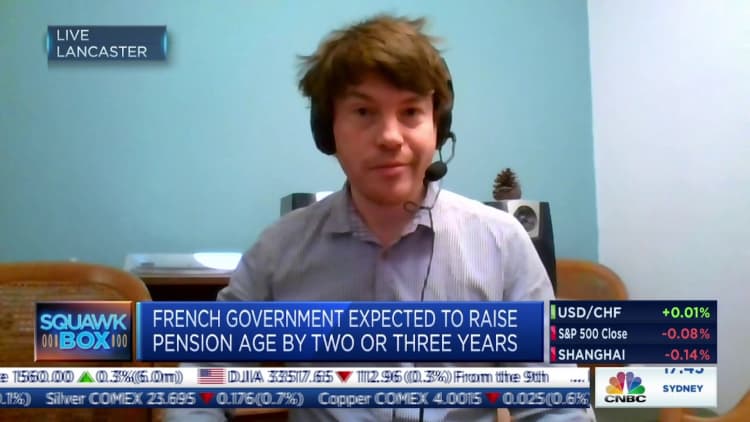The French government presents new plans to modernize the pension system. Analysts expect a backlash from some workers.
Norphoto | Norphoto | Getty Images
French president Emmanuel Macron Walk at it again: A new pension reform will be introduced on Tuesday, and it’s expected to face some backlash.
Macron is serving his second term as France’s president, but pension reform is a longstanding promise dating back to when he was first elected in 2017.
The legal retirement age in France is currently 62 – lower than many developed markets, including much of Europe and the United States. The public sector also has “special systems,” or sector-specific deals that allow workers to retire before they turn 62.
in late 2019Macron’s government proposed a single points-based system, which enables a person to retire once they have a certain number of points. The idea was to harmonize the rules across sectors.
But the plan was met with an uproar. Public sector workers – who arguably have the most to lose from potential reforms – have protested for days in some cases The country’s biggest strikes in decades. Amidst this strong opposition and Corona Virus pandemic, Macron decided in early 2020 to postpone the plans.
This year will be the year of pension reform.
Emmanuel Macron
President of France
There has been some talk of reconsidering plans in early 2022, but it is considered to be very close to the presidential election, which took place in April last year.
Macron said during his tenure: “This year will be the year of reforming the pension system, with the aim of achieving balance in our system in the coming years and decades.” New Year’s address.
“As I promised you, this year will indeed be the year of reforming the pension system, which aims to ensure the balance of our system for the coming years and decades.”
He added that he wanted to conclude the negotiations in time for the implementation of the new rules from the end of summer 2023.
“There will be disorder, there will be strikes, [but Macron] Renaud Foccart, senior lecturer in economics at Lancaster University, decided to go fast: the current measure is supposed to last no more than 90 days.
He added, “It may be quick and dirty, but it is more likely to pass than it was five years ago.”
Etienne Ollion, a professor of sociology at the Ecole Polytechnique, told CNBC’s Street Signs on Tuesday that Macron is “eager to maintain the president’s reformist image.”
His first term was dominated by major reforms that touched on items such as labor and tax laws.
what are you expecting
One of the main issues will be the new retirement age. In the past, Macron has suggested that this figure could be raised from 62 to 65, but at a gradual pace with increments of about 4 months annually until 2031.
French media reported that the government is considering increasing the amount earned by those with the lowest pensions in a bid to make the transition to a longer working life more acceptable to the public. CNBC has not been able to independently verify this information.

Macron’s first proposal suggested, as of 2019, also addressing so-called “special regimes”.
Any new change to these agreements is likely to lead to a backlash from the affected industries.
France’s relatively low retirement age is a strain on its public finances. The country’s Pensions Advisory Board has reportedly estimated a pension system shortfall of around 10 billion euros ($10.73 billion) each year between 2022 and 2032.

“Incurable bacon nerd. Lifelong tv aficionado. Writer. Award-winning explorer. Evil web buff. Amateur pop culture ninja.”
